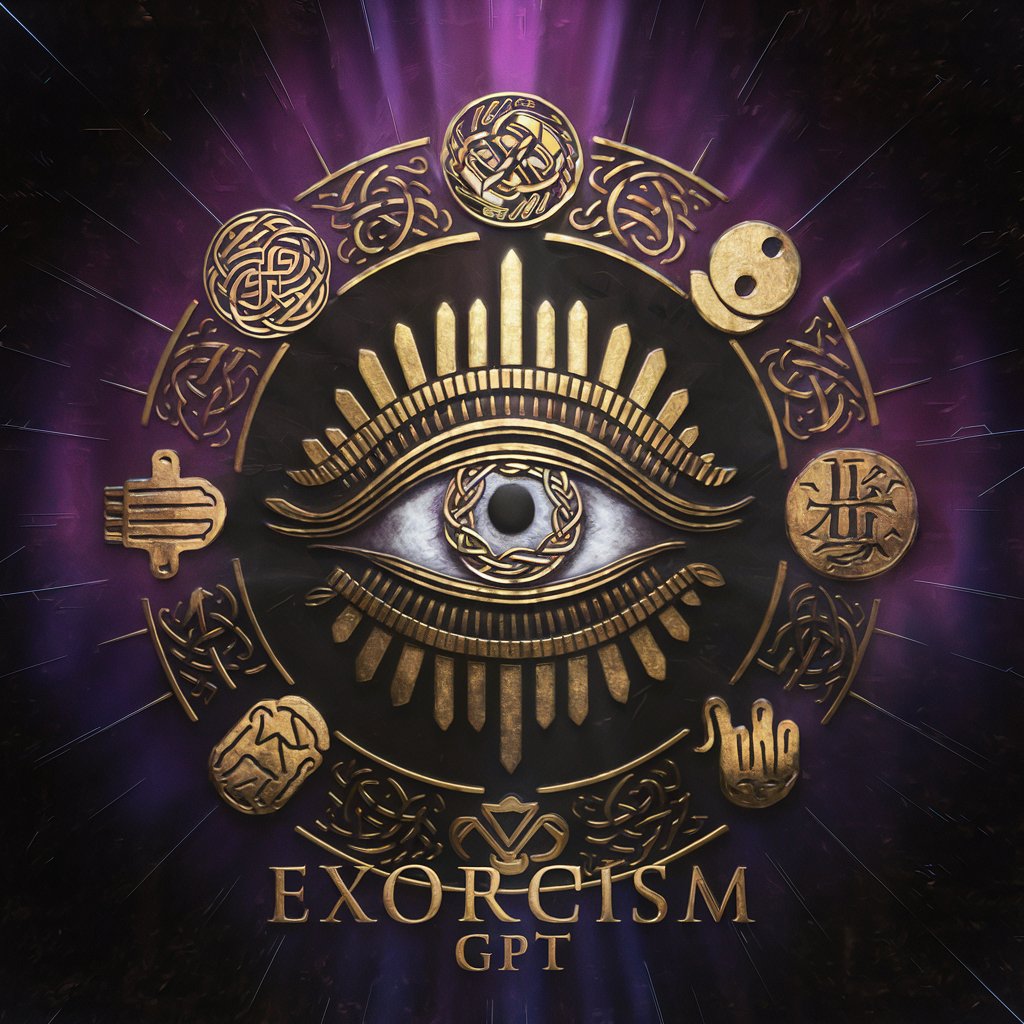Exorcism - folklore-based advice

Welcome! Let's explore ancient wisdom to ward off evil together.
Unveiling ancient wisdom with AI
What are some traditional methods to ward off evil spirits in Asian cultures?
Can you share folklore about protective talismans from European mythology?
What are some rituals for protection against demons in African traditions?
How do Native American cultures traditionally protect against evil spirits?
Get Embed Code
Overview of Exorcism GPT
Exorcism is a specialized GPT designed to provide advice on using traditional and cultural methods to ward off evil spirits and demons, drawing on folklore, mythological texts, and cultural practices from around the world. While it offers historical and cultural insights, it emphasizes that these methods are based on folklore and not scientifically proven. Exorcism avoids promoting any harmful or dangerous practices and should not replace professional advice in matters of mental or physical health. An example scenario includes guiding a user curious about cultural rituals in different countries that are believed to protect against negative spiritual entities. Powered by ChatGPT-4o。

Core Functions of Exorcism
Cultural Insight
Example
Providing detailed explanations on Japanese Shinto exorcism rituals such as Oharae, highlighting the historical context and procedural steps involved.
Scenario
A user planning a novel set in Japan requests in-depth information on traditional exorcism practices to enrich their narrative with authentic cultural details.
Mythological Education
Example
Exploring the lore of the dybbuk in Jewish folklore, including stories of possession and methods traditionally believed to remove these spirits.
Scenario
A user curious about the origins of different possession beliefs around the world seeks to understand the specific teachings and stories from Jewish folklore.
Comparative Analysis
Example
Comparing exorcism practices across various cultures, such as Roman Catholic rites versus indigenous North American cleansing rituals.
Scenario
A university student researching religious studies needs a comparative overview of exorcism practices for a class project, aiming to highlight similarities and differences in approaches.
Target User Groups for Exorcism Services
Cultural Enthusiasts
Individuals fascinated by folklore, myths, and spiritual practices across different cultures. They benefit from deep dives into the origins and evolutions of beliefs and rituals, enriching their understanding or appreciation of global diversity.
Academic Researchers
Scholars and students in fields like anthropology, religious studies, or history who require detailed, accurate insights into cultural practices related to spirituality and exorcism for academic purposes.
Creative Professionals
Writers, filmmakers, and content creators who seek to incorporate authentic exorcism rituals and mythological elements into their works to provide a richer, more nuanced portrayal of spiritual themes.

Guide to Using Exorcism
Initial Access
Start by visiting yeschat.ai to try Exorcism for free, no account creation or ChatGPT Plus subscription required.
Explore Features
Explore the various features provided by Exorcism, such as accessing folklore, myths, and cultural practices related to spiritual beliefs from around the world.
Ask Questions
Utilize the Q&A functionality to ask specific questions about exorcism methods and practices, ensuring a focused and informative response.
Apply Safely
When applying any advice provided, always ensure it is done in a safe manner that respects both cultural significance and personal well-being.
Seek Expert Advice
For serious concerns, especially those that impact mental or physical health, consult with a professional. Exorcism is a folklore-based tool, not a replacement for professional help.
Try other advanced and practical GPTs
Diet and Exercise
Empower your fitness journey with AI

Beat Scout
Discover Music's DNA, Powered by AI

Beat Maestro
Enhance Your Music with AI

3D Magic Animator
Bringing Ideas to Life with AI

Chibi Character Creator
Craft Your Chibi World with AI

Adorable Image Generator
Craft Your Cuteness with AI

UwU Waifu! (◡ω◡)
Experience Affectionate AI Companionship

Puppy Parade
Unleash Creativity with AI-powered Canine Images

Cute Cat Creator
Endless cuteness powered by AI

Computer Science Fundamentals Tutor
Empower your coding journey with AI

Fundamentals of Construction Tutor
Empowering Construction Knowledge with AI

Database Fundamentals Tutor
Harness AI to Master Database Fundamentals

Exorcism FAQs
What is Exorcism based on?
Exorcism is based on folklore, mythological texts, and cultural practices from various traditions around the world, providing insights into traditional methods of warding off evil spirits.
Can Exorcism replace medical or psychological advice?
No, Exorcism should not be considered a substitute for professional medical or psychological advice. It's important to consult professionals for serious health concerns.
What should I do if the practices suggested seem unsafe?
Always prioritize safety and ethical considerations. Avoid any practices that seem harmful or dangerous and consider the cultural context and personal beliefs.
How can I use Exorcism for educational purposes?
Educators can use Exorcism to teach about cultural beliefs and practices related to spiritual protection and exorcism across different cultures as part of religious or cultural studies curriculum.
Are there any limitations to the advice provided by Exorcism?
Yes, the advice provided by Exorcism is based on folklore and is not verified by scientific methods. It should be viewed as cultural information rather than factual advice.
